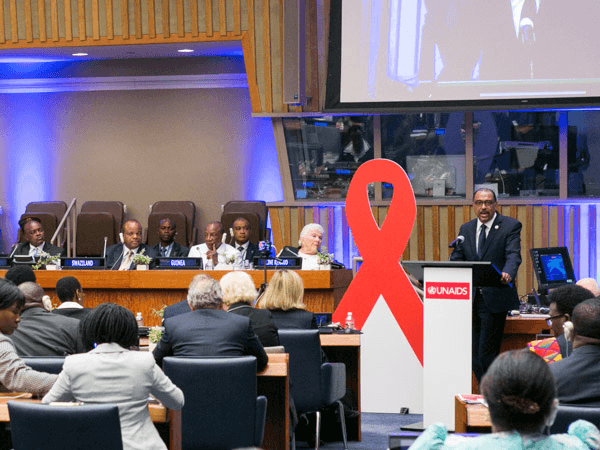With world leaders gathered in New York for the UN General Assembly, ICAP at Columbia University—in partnership with PEPFAR and CDC— announced new data on the state of HIV epidemics in Lesotho and Uganda. The data, derived from Population-based HIVImpact Assessment surveys, show remarkable progress in Lesotho and a stabilization of Uganda’s previously expanding epidemic.
In Lesotho, where ICAP conducted LePHIA from November 2016 to May 2017, results show HIV viral load suppression—a key marker of the body successfully controlling the virus—has reached over 67 percent among all HIV-positive adults ages 15-59. This finding suggests that Lesotho is on track to achieve epidemic control by 2020, through reaching the UNAIDS 90-90-90 targets and expanding HIV prevention. Full achievement of 90-90-90 is equal to viral load suppression among 73 percent of all people living with HIV.
In a press conference to announce the results, Deputy Prime Minister Monyane Moleleki confirmed the Lesotho government’s commitment to build on the achievements made and to keep addressing gaps shown in the survey data.
With the announcement of the LePHIA results, five African countries are now approaching control of their HIV epidemics: Lesotho, Malawi, Swaziland, Zambia, and Zimbabwe. In addition, Uganda’s epidemic has likely stabilized due to increases in coverage of voluntary medical male circumcision for HIV prevention, as well as expansion of HIV treatment, including for pregnant women living with HIV.
“With five African countries approaching control of their HIV epidemics, we have the extraordinary opportunity to change the very course of the HIV pandemic over the next three years,” said Ambassador Deborah L. Birx, U.S. global AIDS coordinator and special representative for global health diplomacy.
ICAP’s global director, Dr. Wafaa El-Sadr concurred that the results are cause for optimism, but also note that there is much work still to be done. “These findings show marked progress against HIV in Lesotho and Uganda, but also highlight the need for focused attention as we move forward,” she said. “It is evident that young people, particularly young men under 35 years of age, are reluctant to get tested for HIV, which hinders efforts to stem the spread of this infection. Reaching them is critically important to achieving the ultimate goal of ending this epidemic.”
To mark the progress countries have made toward the 90-90-90 targets and rally momentum around ending AIDS, Ugandan President Yoweri Museveni co-hosted a high-level event with UNAIDS in New York on Thursday, September 21. The event featured heads of state from Guinea, Malawi, Seychelles, Swaziland, Uganda, and Zambia, as well as Ambassador Birx and other distinguished guests.
The immense showing of world leaders spotlighted the energy and resources governments and the international community are focusing on HIV/AIDS. UNAIDS Executive Director Michel Sidibé noted, “Leadership, partnership, and innovation will transform the epidemic.” President Museveni added, “I am confident that working together with you all, we shall attain an AIDS-free Africa. It is possible to end AIDS in our generation!”
Header image: UNAIDS







